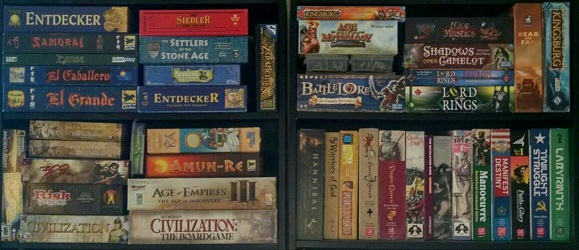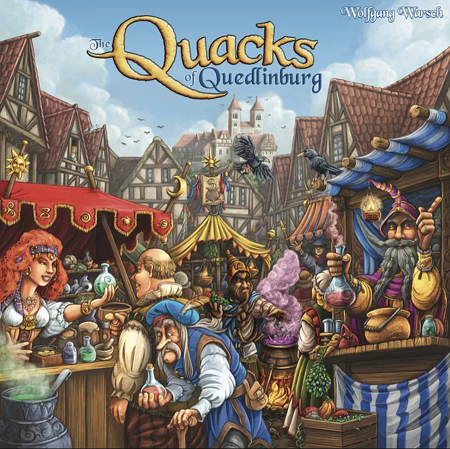My Board Game Biography
Considering how much I love to play tabletop board games, it’s a little odd that I haven’t posted about the subject so much on this blog. That’s partly because I started In the Zeitgeist amidst the political turmoil of 2016-17, and stayed focused on generations-based political and social analysis. There was a lot going on in my personal life to post about as well. This blog was meant to be part commentary, part diary, and I had a lot to say about what was happening around me, just not about what board games I was playing.
But believe me, throughout all of the troubles and changes of these times, I have been playing lots of board games. It is one of my favorite hobbies, one that I’m passionate about, and it’s a wonderful form of escapism and distraction from the real world. I am a very imaginative person, and love to immerse myself in a game setting and just imagine that I’m off in another realm, playing some other role. And I really enjoy strategy games that make you think, and solve problems.
In this post I’ll relate my gamer biography.
I honestly couldn’t tell you when I started playing board games. It must have been when I was very young, in the 1970s. As a Gen X kid, I would have been exposed to the classic board games of postwar America. I mean games like Monopoly, Clue, Careers, The Game of Life. If you’re from my generation, you played them too. Then at some point I got into the more nerdy strategy board games that were available in that time period. A major company of that era was Avalon Hill, which made board games such as Titan, Diplomacy, and Civilization. I played all of those games with my nerdy high school friends.
When I started college at Virginia Tech, I joined a club called “The Wargamer’s Club.” I met a bunch more nerdy gamers there, some of whom I am still in touch with after all these years. We played games such as Illuminati, Nuclear War, and Cosmic Encounter. These are all games that could be considered “old school.” They had rules that were a bit more chaotic and luck-based than is the norm in board games today. There is actually a significant rift between the style of these older games from American companies and the modern style that began in Europe in the 1990s. More on that in a bit.
Another game that was very popular in my college and immediate post-college days was Axis & Allies, a World War II based wargame. Some friends of mine and I were so obsessed with this game that we ended up expanding it with extra rules and creating our own maps for it, so that we didn’t get bored playing the same game on the same map over and over. The game itself has a great system, and now there are a myriad of versions and variants with different maps, focusing on specific theaters or time periods of the war. But back in the late 1980s and early 1990s we didn’t have these new versions, so we had to make our own.
In the mid 1990s I was still in my college town, working at the University’s Computing Center. It was there that I was first introduced to Eurogames, by a work colleague who started a lunch game day (we played every Wednesday). He introduced some of us at work to a new wave of board games that was coming out of Germany. The first one we played was “Die Siedler von Catan,” which translates to “The Settlers of Catan.” You may know it today as simply “Catan.” It has become quite popular in the United States, and today’s young players weren’t even born when it first came out!
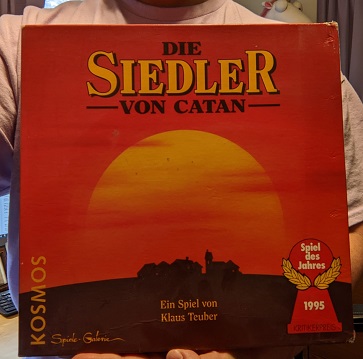
We played other games coming out of Germany in this time period, such as Entdecker, El Grande, and Modern Art. We ordered our copies through a web site called The Game Cabinet, downloading translations of the rules in English, since the games came from Germany and usually only had German rules in them. We all got hooked on these new titles, and would put in big combined orders to save on shipping. I still have all these old German editions of the games in my collection, too.
What was so appealing about these new board games? Well, they tended to have more carefully balanced and streamlined rules than the older ones. There was less luck involved, and more structured play that always took you to an end game in a reasonable amount of time. There was also no player elimination, so everyone got to play all the way to the end. You were trying to optimize your score versus that of the other players, not necessarily trying to tear down what they were building up in a bid to be the last one standing, as it used to be done. This was the beginning of what became known as “Eurogames,” to distinguish them from the American style of games we had been used to.
Over the years since, there has been a veritable explosion of board games in this style. The hobby has taken off worldwide to heights unimaginable back then, and there are so many thousands of titles it boggles the mind. You might call it a board game Renaissance, and even the mainstream media has caught onto it. If you know me on social media, I’m sure you’ve seen all kinds of interesting board game pictures in my posts.
But before we get to the state of board games today, more of my board gamer biography. I left Virginia in 1996, and after a bit of wandering ended up in North Carolina. I met more people there who liked tabletop gaming; I guess it’s just inevitable when you have a certain mindset that you will meet likeminded people wherever you go. One game I remember that we liked a lot back then was Twilight Imperium, which is an epic space exploration and empire game featuring massive space battles. It was really more in the older style of board game or wargame, with rigid turn orders and intense conflict, and it could also take a long time to play. I guess the old style still had its appeal.
At some point in the 2000s I stopped playing games much, and in fact entered a dark period in my life, where I fell into deep depression. I became a complete recluse, never leaving the house except for necessary errands, which included seeing a psychiatrist. My psychiatrist recommended reviving my social life, and suggested that I might have some hobby that could be a way to meet people. Board games was an obvious choice. So, with much personal effort, I got myself back out there and started going to a local game store (“FLGS” is the conventional term) and my board gaming life picked up again. This would have been around 2007.
I met new people, discovered new board games, and even started going to board game conventions in the area. These are gatherings (like any other convention) where all you do is play board games for days on end. There are even bigger game conventions (I’m sure you’ve heard of them) which include other kinds of games, panels and guests, cosplay contests and merchant dealers – they’ve got it all! I’ve been to a few of those, but honestly I prefer a smaller local convention which is mostly people who know one another, where it’s easier to find a game to play and to focus on the gaming itself.
The mid-2000s would have been about the time that the board game hobby was really taking off, as I already mentioned. Meanwhile, I recovered from my mental health issues, bought a house, and progressed in my career. It was like my personal life and the board gaming world were sharing a trajectory of rising growth and prosperity. There was an endlessly flowing cornucopia of new board game titles, and ample opportunity to play them with different gaming groups. My game collection grew and grew as I picked up copies of the new games that I liked the most. I was now heavily into modern style board gaming as a hobby, though I pretty much stopped playing wargames, which I do sometimes miss.
In 2013, I attended my 30th year high school reunion, where I met up with my dear old friend, Aileen. We reunited in life, and started travelling a lot together. Much to my delight, she also likes to play board games. In fact, we had played games together back when we knew each other in high school. She came to some of the gaming conventions that I was already attending, and we brought games with us when we travelled, playing in the hotel lobbies or suites where we were staying. In 2018, I sold my house in North Carolina and moved up to Pennsylvania, where she lives.
Then, in 2020 when the pandemic hit, I moved in with her. We combined our board game collections, which at this point consists of many hundreds of titles. I do my best to keep them organized, by theme and by type of game (for example, abstract or wargame), and by size of box (since they store more easily that way).
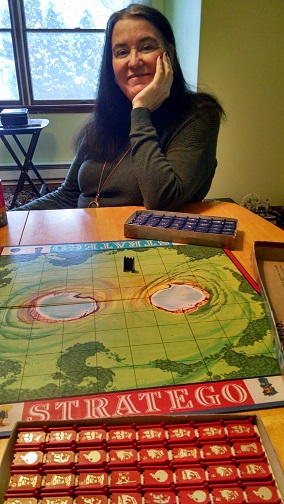
We continue to play board games when we can, though not so much at conventions or game stores since the pandemic began (but just last weekend, we did go to our first game convention in over two years). Mostly Aileen and I play two player games. We’ve even dug out some copies of games that we played back when we first met as teenagers. For example, not too long ago we played the old classic, Stratego. Yes, we have the same exact copy of the game that we played together in high school!
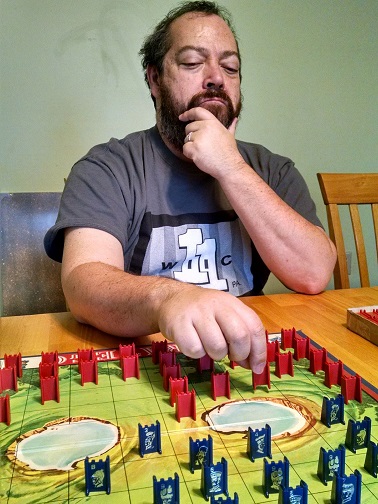
I also play online sometimes with some of my North Carolina friends. A lot of board games, new and old, have digital implementations, easily accessible online. Sometimes you can play them for free, sometimes you have to buy them like any other computer program. I enjoy online play well enough, but much prefer sitting around the table, interacting in real life with people, and physically manipulating the components. There’s just something especially satisfying to me about that tactile and physical presence aspect of board gaming.
I’m very grateful to be living during this Golden Age of Board Gaming, even though I know I’ll never have the time for all the games that are out there. It’s enough to have time at all for the fleeting pleasures of life.
If you like board games, you probably should check out the web site BoardGameGeek, where you can learn about every board game ever made, and join an online community of board gamers who review, discuss, and share their experiences with board games. You can check out my user profile there to learn more about me, and even see our collection, which I maintain meticulously. I even made a GeekList (that’s a BGG thing) about that Axis & Allies variant that we played so much back in the early 90s. There’s a lot more I could write about my life of gaming, as this post hasn’t even touched on other kinds of games, such as tabletop roleplaying games or collectible card games, which I’ve also played a whole lot in my life. Who knows, they might be subjects of some future post.
